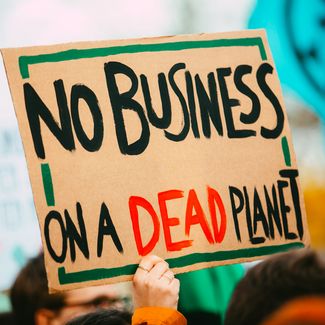
Silence At What Cost? Why Avoiding Sustainability Damages Reputations
In its latest report, Revolt outlines the business benefits of talking about sustainability
30 July 2025
The majority of British consumers care about sustainability and are willing to pay more for sustainably produced products, despite worries about inflation and the cost of living crisis. And yet, the majority of businesses (79 per cent) are still failing to communicate their environmental strategies authentically, finds a report released by purpose-led creative agency Revolt.
Since the turn of the year, with a highly polarising regime change in the White House, businesses have become quieter around their sustainability credentials, mainly due to an uncertainty around what to say and how to do it. This purposeful silence has become known as ‘Greenhushing’, costing businesses - and potentially the world - dear.
Whether it is the result of PR-related fear or a miscalculation of actual impact, the phenomenon is hindering rather than helping companies.
During the first half of the year, the agency’s parent company, Anthesis held a number of small forum conversations with both clients and sustainability practitioners working within national and multinational businesses. From this, it discovered five key drivers, which it has named ‘The Headwinds of Silence’.
These were:
· Uncertain Context
· Target Backlash
· Worried Marketers
· Distracted CEOs
· Emerging Legislation
It also conducted research to assess the environmental communications policies and subsequent business performance of more than 500 companies operating across 16 sectors, discovering that when done correctly, their reputational performance was enhanced and that silence on the topic was damaging.
It also discovered that almost half (49 per cent) of marketers in the UK are wary of working on sustainability campaigns, while some 63 per cent of FTSE 100 companies are at risk of greenhushing.
“You don't have to talk about everything you're doing. You need to find the one, two, or three things that are really going to connect and resonate," advises Revolt's senior strategy lead Olly Lawder.
From the business benefits of talking about sustainability, to the balance between greenwashing and greenhushing, he outlines several key lessons from the report.
The business of sustainability
"Companies with a higher than average performance on sustainability also have an EBITDA that is 6 per cent higher than average," Lawder reveals from the findings of the report.
Meanwhile, up to 31 per cent of the reputational advantage of leading businesses can be explained by their stance on environmental issues.
The tech and food and beverage industries gained the most positive impact on their reputation - with an 8 and 6 per cent increases respectively.
More than three-quarters (79 per cent) just to be inauthentically communicating their environmental performance too.
"The thing that surprised me was just how crucial the environmental storytelling element was for the most iconic brands out there," Lawder continues.
Greenhushing vs greenwashing
"People haven't changed nearly as much as we might be led to think," Lawder says.
He adds that despite the scepticism, consumers continue to prioritise more sustainable products - 49 per cent bought a sustainable product in 2025, up from 43 per cent in 2024.
"What the report showed is that only about 20 per cent of companies are getting it right. The rest are either greenwashing or hushing - many could adjust slightly and be significantly better," adds Lawder.
He adds that many clients are keen to ascertain where they can build, where they have a "reputational deficit" and where they have an "advantage".
"The other thing we'll be doing down the line is looking more at those who are really doing things right in this space and sharing some learnings," Lawder continues.
Why the advertising industry should care
Lawder highlights that for the advertising industry sustainability is a business and reputational responsibility as well as a social one.
While many advertisers note an attitude-behaviour gap on sustainability and fear being accused of greenwashing, for Lawder, there is also real risk in not talking about sustainability positives.
After all, searching for sustainability successes is itself the first step to identifying areas to work on, as well as those to celebrate.
"When you give a brief to an agency you're putting your reputation in their hands. And if they don't understand this issue and they're not able to turn it into communications - that is not only going to resonate but is also going to avoid damage," he adds.
Download the full report here.







